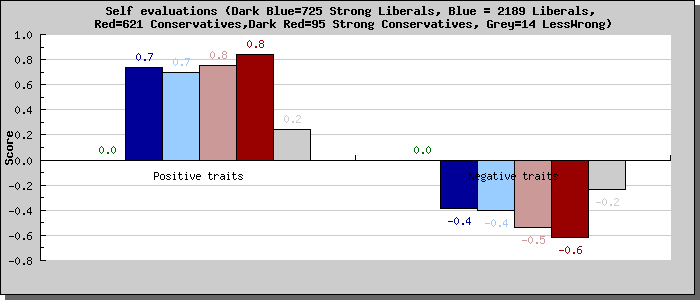|
The scale you just completed was similar to a study
about self-evaluations by David Dunning, Judith Meyerowitz, and Amy
Holdzberg (1989). This scale is designed to measure the
better-than-average effect, which is also known as the illusory
superiority bias. Past research shows that across a number of traits
and abilities, the majority of people tend to rate themselves as better
than average, even though this is not possible statistically. For
example, one famous study (Svenson, 1981) showed that 93% of Americans
believed they were better than average drivers.
We are interested in examining how liberals and
conservatives score on this scale. It is possible that one of these
groups is more likely to engage in the illusory superiority effect, as
well as other positive self-illusions. However, it is also possible
that both liberals and conservatives engage in these kinds of biases
equally.
The graph below shows your scores separately for
self-evaluations on positive and negative traits. The scores range from
-2 to +2. Positive scores indicate that you rated yourself as more
likely than the average person to possess that kind of trait, and
negative scores indicate that you rated yourself as less likely to
possess that kind of trait. Your score is shown in green (1st bar). The score of the average liberal respondent is shown in light blue and the score of the average strong liberal is shown in dark blue. The average conservative score is shown in light red and the score of the average strong conservative is shown in dark red.
You are a member of the group:LessWrong and those results are shown with the Grey bar.
If you want to learn more about the better-than-average effect, you can read this Wikipedia article.
Dunning, D. A., Meyerowitz, J. A., & Holzberg, A. D. (1989).
Ambiguity and self-evaluation: The role of idiosyncratic trait
definitions in self-serving assessments of ability. Journal of Personality and Social Psychology, 57, 1082-1090.
Svenson, O. (1981). Are we all less risky and more skillful than our fellow drivers? Acta Psychologica, 47, 143-148.
Return to the "Explore" page.
|
